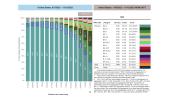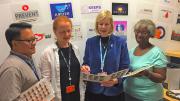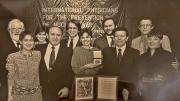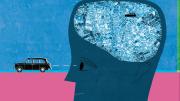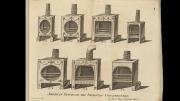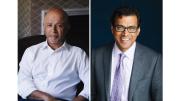A November 17 news briefing by Harvard and other Boston area experts on the current state of COVID-19 in the United States began with a “weather report:”
- Case data no longer reflect the intensity of the pandemic, said Harvard Medical School (HMS) assistant professor of medicine Jacob Lemieux, an infectious disease specialist at Massachusetts General Hospital (MGH). Most testing is now conducted at home, and positive cases are underreported.
- More useful are the data on hospitalizations and deaths, both of which have been holding steady. About 300 Americans die of COVID-19 every day: an annual rate, he pointed out, of about 110,000 fatalities, triple the number that would die of flu in a typical season. “COVID-19,” Lemieux said, “is still the most severe respiratory viral illness in the adult population at this time, and it’s a major cause of death nationally.” (More than 1 million Americans have died since the beginning of the pandemic).
- There are numerous variants of the Omicron form of the coronavirus circulating simultaneously, and the two outcompeting the others are BQ.1 and BQ1.1. Healthy, vaccinated individuals remain protected against severe disease caused by these variants.
- But with these BQ variants, “The virus has outrun the current generation of monoclonal antibodies,” he said; they are now effective only one-quarter to one-third of the time. Such therapies were the last line of defense for individuals with severe cases, including those who are immunocompromised by, for example, cancer treatments.
- A potential “tripledemic” of COVID-19, respiratory syncytial virus (RSV), and flu this winter suggests that there are risks, he continued, to “all ages and subsets of the population” from three dangerous respiratory viruses.
Assistant professor of medicine Kathryn Stephenson, an infectious disease expert at Beth Israel Deaconess Medical Center, emphasized the importance of getting a COVID-19 vaccine booster shot. Any kind of boost “reduces your chances of getting very sick from COVID,” she reported, but about half of all Americans have not been boosted. Given that the durability of the vaccines to protect against severe disease is uncertain, for those people who “got their primary series back in December 2021, that’s not good enough,” she said.
Vaccination rates are particularly low among young children, reported assistant professor of pediatrics at MGH Lael Yonker. In some states, the vaccination rate in the six-month to four-year age range is around 2 percent. Overall, she emphasized, vaccination rates are low among children, despite the evidence that vaccines can prevent hospitalization and the incidence of Multisystem Inflammatory Syndrome in Children (MIS-C), “which presents with high fevers, some abdominal pain,” and can lead to cardiac problems. “Vaccination,” she said, “helps protect against that as well.”
Of immediate concern, Yonker continued, is the fact that pediatric intensive care units across the country are full to overflowing with cases of RSV. “Kids are waiting in the emergency room for days on oxygen” until beds become available, she explained. Fortunately, new cases of RSV seem to have plateaued, raising the hope that they might start to decline.
But the holidays will present a challenge. The responses of these experts—convened by the Massachusetts Consortium on Pathogen Readiness (MCPR) in a conversation moderated by MCPR faculty co-leader Bruce Walker—to the question of what they were going to do for the holidays were telling. Lemieux reported that his immediate family is coping with RSV, and hopes to be recovered in time to celebrate with extended family members. Stephenson noted that she has COVID-19 now, and would therefore not see older relatives until she is recovered. All offered practical holiday health advice:
- If people are sick (including having a “cold” that might actually be RSV), they shouldn’t attend gatherings.
- If vulnerable people are going to be at the planned gathering (the elderly at risk of COVID-19 or children at risk of RSV) there could be a role for additional precautions, such as rapid testing in the hours before the event and improved ventilation (by opening windows or holding parts of a gathering outdoors).
- Being vaccinated and boosted also lowers risk of COVID-19 for everyone in attendance.
- And travelers should consider wearing masks, particularly on airplanes, added Yonker. Because she will host a large family gathering, she is having her children mask in the week leading up to Thanksgiving.
Summing up, said Lemieux matter-of-factly, “People need to assess risks”—and “be open to dynamically changing plans.”
